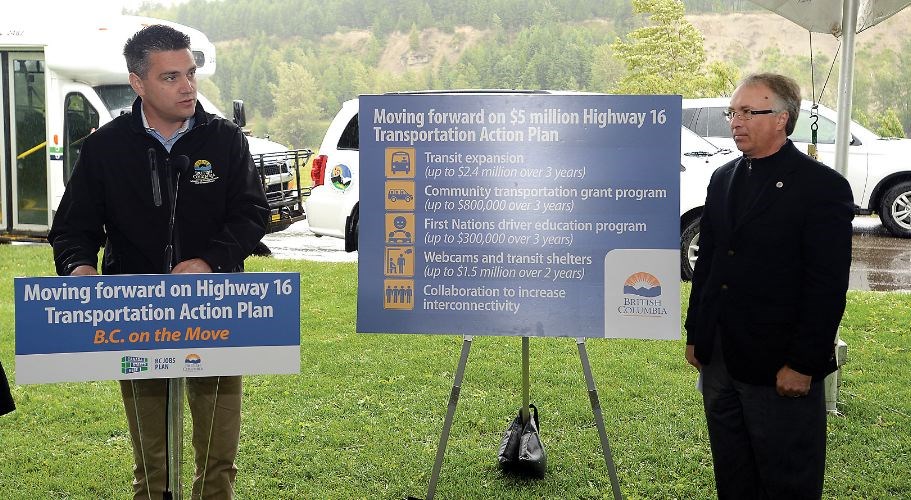Progress is being made towards establishing a public transit system along Highway 16 West, transportation and infrastructure minister Todd Stone said Wednesday.
Speaking at a media event held at Lheidli T'enneh Memorial Park, Todd said much of the groundwork has now been laid and stakeholders are now getting down to working out the final details for a service stretching from Prince George to Prince Rupert.
According to a provincial government news release, B.C. Transit plans to have the first of the buses on the road by the end of this year and to have the entire corridor - known as the Highway of Tears - connected in 2017.
Schedules and fares must still be worked out and buses must still be ordered, but "by the end of next year I'm very confident we're going to have a transit service connecting every single community from Prince Rupert to Prince George," Stone said in an interview.
During the event, Stone highlighted an injection of a further $2 million in federal and provincial government funding into the effort. It raises the total budgeted to $5 million over three years, compared to two years previously.
NDP women's critic Maurine Karagianis said Stone did little more than repeat previous announcements and noted the idea of a transit system along Highway 16 has dated back to at least the 2006 Highway of Tears Symposium.
"As much as I'm happy every time they say they're going to get on with it, I'm also disappointed that they aren't getting to it a lot faster," Karagianis said. "Waiting until close to the next election [to fully implement the service] seems to me a bit callous."
The so-called "triple-delete scandal," in which a now-former ministerial assistant to Stone allegedly deleted e-mails to prevent them from being released in response to a freedom of information request was related to the Highway of Tears, Karagianis noted.
"The government has been wearing this shameful lack of action for a very long time," Karagianis said. "For me, I just say get some buses in place, get them running as soon as possible."
Stone said B.C. Transit has now signed memorandums of understanding with all 16 municipalities and regional districts along the corridor expressing their commitments to the scheme.
The money earmarked for the service will be spent on a cost-sharing basis with B.C. Transit covering two-thirds and participating communities the remaining one-third. Stone has said that's "exceptionally generous" when compared to the more typical arrangement that sees communities cover 45 per cent.
As for the the additional $2 million, Stone said $800,000 a year will be spent over three years on the transit service, up from two years; $1 million will triple the amount of money available for webcams and bus shelters; a First Nations driver education program - to boost the number of Class 4 and 5 drivers in those communities - will be doubled to $300,000 over three years; a grant program to help communities north and south of the highway buy shuttle vehicles will be increased by $50,000 to $800,000 over three years.
"These steps will soon translate into tangible results for First Nations communities and local communities up and down the Highway 16 corridor," Stone said.


